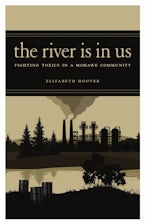"The River Is in Us takes readers to Akwesasne-a place where decades of environmental contamination has become embodied through acts of traditional land-based subsistence. Emphasizing inescapable connections between food and health, Elizabeth Hoover suggests how environmental justice, affirmative indigenous identity, and decolonization might be achieved at individual, social, and structural/political levels. Essential reading for anyone interested in intersections of ecology, sustenance, and survivance in Native North America."-Anna J. Willow, Ohio State University, author of Strong Hearts, Native Lands
"Navigating historical and political landscapes of industrial colonialism along the St. Lawrence River, Elizabeth Hoover illustrates how Mohawk people revolutionized environmental health research through the development of a community-based participatory research model. Her rich ethnography will leave an enduring mark on the field of Indigenous environmental studies."-Clint Carroll (Cherokee Nation), author of Roots of Our Renewal
"The River Is in Us is rewarding reading for anyone interested in environmental justice or indigenous people."-Foreword Reviews
"Hoover’s study is comprehensive, historically sound, richly detailed, and sensitive to the Mohawks’ perception of the crisis as they wage a continuing struggle to rehabilitate their homeland, rallying to face an existential threat."-CHOICE
"Elizabeth Hoover manages to tell this complex story from a complex setting implicating multiple locations of academic and indigenous theory, in a way that is engaging and instructive."-American Indian Culture and Research Journal
"The River Is in Us offers a sweeping analysis of the psychosocial and material effects of industrial contamination of the St. Lawrence River on the Mohawk community of Akwesasne. The book ultimately provides us with a rich, moving story of indigenous survivance, resilience, and regeneration."-Medical Anthropology Quarterly
"The River Is in Us is as provocative as it is urgent and as accessible as it is earnest. Hoover’s ethical investment in her scholarship’s relational scope is as earnest as it is inspiring. She indeed highlights the history of industrial environmental contamination as it has impacted the Akwesasro:non but, more importantly, celebrates the strength and resilience the community has exemplified while challenging the forces of colonization."-Environmental History
"Elizabeth Hoover’s The River Is in Us is an exemplary text that highlights indigenous self-activity and the threat it poses to the US settler colonial project."-Radical History Review
"Hoover’s emphasis on the connection between ecology and both individual and public health with that of rural livelihoods on practical rather than idealized terms makes this a valuable ethnographic contribution."-PoLAR
"An exquisite example of best practices and expresses a deep and abiding respect for the natural world and the people who care for it."-Journal for the Study of Religion, Nature and Culture

